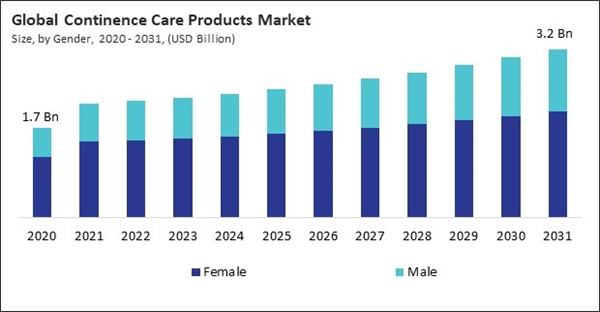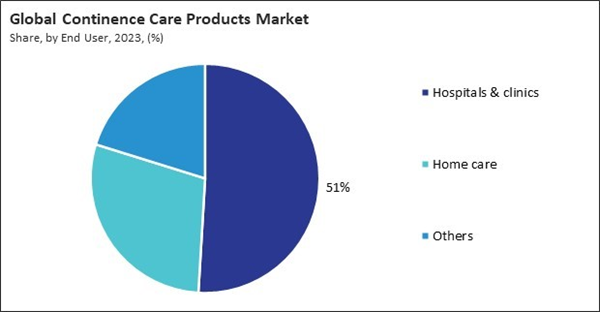Incontinence can be exacerbated by health issues such as obesity and diabetes, which are influenced by sedentary lifestyles, dietary habits, and elevated stress levels. According to projections made by the Asian Development Bank, 40 percent of the people living in Asia Pacific will be over the age of 60 by the year 2050. Between the years 2010 and 2050, it is anticipated that the population of senior people throughout the region will increase by a factor of three, reaching a total of about 1.3 billion people. Therefore, the Asia Pacific region is expected to attain 28% revenue share in the market by the yar 2031. With a significant increase in elderly populations, there is a corresponding rise in age-related health issues such as urinary incontinence which will increase the demand for continence care products.
As awareness about incontinence increases, individuals are becoming more proactive in recognizing symptoms and seeking appropriate care. This heightened awareness improves early diagnosis and treatment and fosters a greater acceptance of continence care products as essential tools in managing daily life. The shift towards greater awareness is supported by educational campaigns, healthcare initiatives, and advocacy efforts that destigmatize incontinence. By normalizing conversations about bladder and bowel control issues, these initiatives empower individuals to address their healthcare needs without fear of judgment or embarrassment. Consequently, more people are inclined to explore and utilize continence care products that fit their lifestyles and preferences.
Moreover, reducing the stigma surrounding incontinence is crucial in encouraging individuals to seek medical advice and use appropriate products for management. Incontinence is a prevalent condition that can affect anyone, irrespective of gender or age, and public awareness campaigns frequently emphasize this fact. By emphasizing the availability of effective management options such as absorbent pads, protective underwear, and medical devices, these campaigns aim to improve the quality of life for individuals living with incontinence. This cultural shift towards acceptance is further reinforced by healthcare professionals who promote comprehensive care strategies that include continence management. Thus, the growing awareness and acceptance of incontinence and its management options will raise the demand for continence care products.
However, Emerging treatments and management options, such as surgical interventions, pelvic floor exercises, and pharmaceutical therapies, offer patients diverse choices beyond traditional continence care products like adult diapers and pads. These alternatives are designed to address underlying causes of incontinence, ranging from bladder or prostate surgeries to strengthening pelvic muscles and hormonal therapies, aiming to improve bladder control and reduce symptoms. Hence, the increasing popularity and efficacy of these alternative treatments could potentially impact the demand for continence care products in the market
Furthermore, the COVID-19 pandemic significantly impacted the continence care products market, bringing challenges and opportunities that reshaped the industry landscape. One of the primary challenges was the disruption in the global supply chain. Lockdowns, travel restrictions, and reduced manufacturing capacities in many countries led to delays in the production and distribution of continence care products. Thus, the pandemic had an overall negative impact on the market.
Driving and Restraining Factors
Drivers- Rising Proportion of The Aging Population
- Growing Awareness and Acceptance of Incontinence
- Advancements In Product Design and Technology
- Availability Of Alternatives in Managing Incontinence
- Environmental Impact of Disposable Continence Care Products
- Increased Healthcare Expenditure Across the Globe
- Enhanced Distribution Channels
- Technological Integration Complexity
- Regulatory Challenges for Manufacturers and Distributors
Category Outlook
By category, the market is divided into disposable and reusable. The disposable segment witnessed 75% revenue share in the market in 2023. Disposable products offer users convenience and ease of use, eliminating the need for washing and maintenance associated with reusable options. They are widely preferred for quick disposal, especially in settings requiring frequent changes, such as hospitals, long-term care facilities, and home care environments.End User Outlook
Based on end user, the market is segmented into hospitals & clinics, home care, and others. The hospitals & clinics segment procured 51% revenue share in the market in 2023. Hospitals and clinics experience a high volume of patients with acute medical conditions, post-surgical recovery needs, and chronic illnesses that may result in urinary or fecal incontinence. Continence care products such as disposable diapers, absorbent pads, and urinary catheters are crucial in maintaining hygiene, comfort, and dignity for patients under medical supervision.Gender Outlook
On the basis of gender, the market is classified into male and female. The male segment recorded 34% revenue share in the market in 2023. As men age, they become more susceptible to urinary incontinence, often due to prostate conditions such as benign prostatic hyperplasia (BPH) or prostate cancer. The prevalence of these conditions increases with age, driving demand for continence care products tailored to male-specific health needs. As awareness and acceptance of male incontinence grow, there has been an increasing demand for specialized products designed to address these specific needs.Product Type Outlook
Based on product type, the market is characterized into urinary catheters, urinary bags & pouch, absorbent products, and others. The urinary catheters segment procured 21% revenue share in the market in 2023. Urinary catheters, including indwelling and intermittent types, are critical medical devices to manage urinary retention or incontinence by draining urine from the bladder into external bags or systems.Regional Outlook
Region-wise, the market is analyzed across North America, Europe, Asia Pacific, and LAMEA. The North America segment recorded 39% revenue share in the market in 2023. The region boasts a well-established healthcare infrastructure, including hospitals, clinics, and long-term care facilities equipped to manage continence. High standards of healthcare delivery and accessibility contribute to robust market demand for continence care products.- Jun-2024: Ontex Group NV plans to restructure its Belgian operations, intending to close the Eeklo site and transform the Buggenhout site into a center of excellence for medium and heavy incontinence products. This restructuring aims to enhance competitiveness through operational efficiency and a €40 million investment.
- May-2024: Coloplast introduces Peristeen Light, a user-friendly transanal irrigation device aimed at easing chronic constipation and faecal incontinence. Based on two decades of experience with Peristeen Plus, it simplifies treatment with easy assembly and gentle insertion, launching in Europe from February 2024.
- Feb-2023: Hollister Incorporated, a U.S.-based developer and manufacturer of ostomy, continence care, and critical care products, announced a $25 million investment in advanced manufacturing technologies to expand its capabilities at the Kaunas plant.
- Jun-2021: Ontex has launched Orizon, a smart continence management service for care homes and hospitals in Europe. It features a sensor-based system that monitors diaper saturation, reducing unnecessary changes and improving resident comfort. Pilot projects in multiple countries have shown significant reductions in leakage and enhanced caregiver efficiency.
- Nov-2020: Coloplast Group acquired Nine Continents Medical, Inc., for USD 145 million upfront to bolster its Interventional Urology business. This acquisition includes an innovative implantable tibial nerve stimulation treatment for overactive bladder, targeting US and EU market approvals by 2024-2025.
List of Key Companies Profiled
- Hollister, Inc.
- Coloplast Group
- ConvaTec Group PLC
- Becton, Dickinson and Company
- Wellspect Healthcare AB
- Essity AB (BSN Medical)
- Boston Scientific Corporation
- Johnson & Johnson
- Ontex Group NV
- Welland Medical Limited
Market Report Segmentation
By Gender- Female
- Male
- Hospitals & clinics
- Home care
- Others
- Absorbent Products
- Urinary Bags and Pouch
- Urinary catheters
- Others
- Disposable
- Reusable
- North America
- US
- Canada
- Mexico
- Rest of North America
- Europe
- Germany
- UK
- France
- Russia
- Spain
- Italy
- Rest of Europe
- Asia Pacific
- China
- Japan
- India
- South Korea
- Singapore
- Malaysia
- Rest of Asia Pacific
- LAMEA
- Brazil
- Argentina
- UAE
- Saudi Arabia
- South Africa
- Nigeria
- Rest of LAMEA
Table of Contents
Companies Mentioned
- Hollister, Inc.
- Coloplast Group
- ConvaTec Group PLC
- Becton, Dickinson and Company
- Wellspect Healthcare AB
- Essity AB (BSN Medical)
- Boston Scientific Corporation
- Johnson & Johnson
- Ontex Group NV
- Welland Medical Limited










